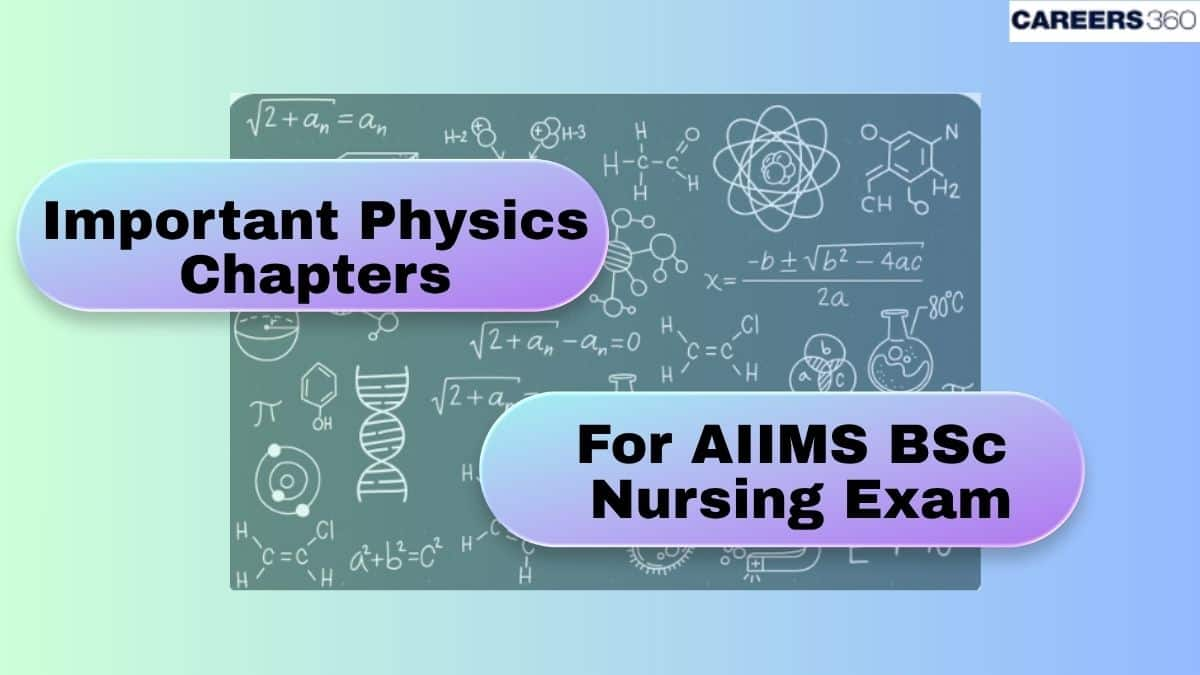AIIMS B.Sc Nursing entrance exam ka syllabus NCERT Class 11–12 par based hota hai. Agar CBSE ya state board ne kuch chapters delete kiye hai, to bhi AIIMS apne original NCERT syllabus se hi questions pooch sakta hai. Deleted syllabus se questions aane ke chances hote hai, kyunki AIIMS
Important Physics Chapters For AIIMS BSc Nursing 2026 Entrance Exam
Physics is an important subject for the AIIMS BSc Nursing 2026 Entrance Exam. 30 out of 100 questions are asked from the physics subject in the exam. Knowing the important Physics chapters helps candidates to focus on key topics and score better in the exam.
This Story also Contains
- AIIMS B.Sc. Nursing Exam 2026 Pattern
- Important Physics Chapters for AIIMS B.Sc. Nursing Entrance Exam 2026
- Tips For Physics Preparation For AIIMS B.Sc. Nursing Entrance Exam 2026

Some of the important chapters in Physics for AIIMS BSc Nursing include electric charges and fields, ray optics and optical instruments, semiconductor electronics, and laws of motion. A clear understanding of these chapters helps students answer conceptual and numerical questions effectively.
AIIMS B.Sc. Nursing Exam 2026 Pattern
AIIMS B.Sc Nursing Entrance Examination tests the knowledge of a candidate in various subjects like Physics, Chemistry, Biology, and General Knowledge. The pattern of examination includes MCQs that have to be answered in 2 hours, which is, 120 minutes. Physics is one of the most important sections for this entrance test, having several topics that need conceptual-based questions.
Given below is the Exam pattern for AIIMS BSc Nursing:
Duration of exam | 120 minutes (2 Hours) |
Mode of exam | Computer-based test |
Type of questions | Multiple-choice questions (MCQs) |
Sections | Physics (30 marks) Chemistry (30 marks) Biology (30 marks) General knowledge (10 marks) |
Negative marking | Yes (-1/3) |
Total marks | 100 |
Important Physics Chapters for AIIMS B.Sc. Nursing Entrance Exam 2026
Physics AIIMS B.Sc. Nursing syllabus has some fundamental chapters where questions are repeatedly asked. Below is the list of the most important chapters that you should aim to enhance your preparation level.
The table given below shows the physics important chapters for the AIIMS B.Sc. Nursing and the key Physics topics to focus on:
Important Chapters | Key Topics |
| |
| |
| |
| |
| |
| |
| |
| |
| |
| |
|
Tips For Physics Preparation For AIIMS B.Sc. Nursing Entrance Exam 2026
Here are the ways of effective preparation on how to study physics for the AIIMS B.Sc. Nursing 2026 Entrance Exam:
Understand Concepts
Physics requires more understanding of concepts than mere memorisation. Understand the principles behind formulas and their application.
Practice Numerical Problems
Most questions that appear in Physics are numerically based. Practising numerical problems regularly from each chapter will help master the application of concepts.
Regular Revision
Regular revision helps to remember concepts. Short notes should be made regarding formulas and important points for quick revision before the exam.
Solve Previous Year Papers
Practising the previous year's AIIMS B.Sc. Nursing papers can give an idea of the types of questions asked and help you estimate the difficulty level of the Physics section.
Popular Courses and Specializations
Popular Degrees
List of colleges accepting AIIMS Nursing
Browse Medicine Colleges by State
Questions related to AIIMS Nursing
On Question asked by student community
Hello,
The All India Institute of Medical Sciences, New Delhi conducts the BSc Nursing entrance examination for admission to the nursing course in various AIIMS Institutes in India.
Physics, chemistry, biology and general knowledge are the subjects one must study for this examination. It is advisable to practice with PYQs
Hello,
here is your Important Chapters for AIIMS BSc Nursing 2026 Exam. I am providing you the link. Kindly open and check it out.
https://medicine.careers360.com/articles/important-chapters-for-aiims-bsc-nursing-exam
I hope it will help you. For any further query please let me know.
Thank you
Hello,
Hello there!
Yes both boys and girls can apply for AIIMS nursing entrance exam. Both boys and girls should meet the same eligibility criteria.
Thank you
Hello aspirant,
An excellent resource for test preparation is the AIIMS BSc Nursing Previous Year Question Papers. The question papers from the prior year must be a part of the study plan for candidates taking the AIIMS BSc Nursing test. Their chances of doing well on the test will increase
Begin a career in Medical and Allied Sciences. Admissions Open for
Allied & Healthcare programs | 20+ Partner Universities & Institutes | 98% placement record
Apollo Healthcare Academy
ApplyGet Job-Ready with New-Age Allied Health Programmes
Emversity Allied Health Programs
ApplyGet Job Ready in Healthcare | Employability-Focused Programs
Amity University-Noida Health and Allied Sciences Admissions
ApplyAmongst top 3% universities globally (QS Rankings) | Wide Range of scholarships available
SRM Kattankulathur Dental College Admissions 2026
ApplyRanked #19 by NIRF, NAAC A++ Accredited | Recognized by dental council of India
SRM Medical College Admissions 2026
ApplyRanked #18 by NIRF, NAAC A++ Accredited | Unmatched clinical exposure with over 7 lakh patients yearly
